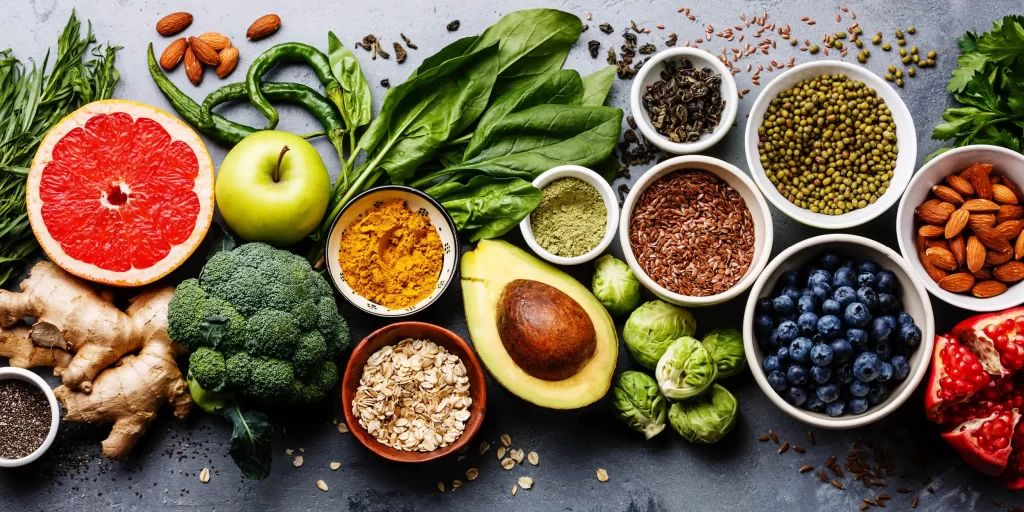What are the Best Alcohol Detox Foods in 2023 & 2024
Written by Rob Alston
& Medically Reviewed by Dr. Sarah Dash, PHD
Medically Reviewed
Up to Date
Last Updated - 6/17/2022
View our editorial policy
As many people become more interested in natural strategies to manage health, it’s common to hear about how foods can support the body’s detox process. Food is important to how we feel, and there are various foods that can support the alcohol detox process.
While food can certainly impact how you feel, it’s important to know that the body has its own efficient system for detoxing from alcohol and food cannot speed up this process. However, while the liver is responsible for clearing waste from your body, what you eat or drink can impact how you feel while alcohol leaves your system. Food can be a helpful way to manage or reduce some of the symptoms associated with alcohol detox.
Hydrating Foods
Drinking alcohol increases the rate at which our body gets rid of water, and drinking often or excessively can cause severe dehydration. The effects of dehydration include fatigue, headaches, and muscle cramps and can make symptoms of detoxing from alcohol worse.
Changing your diet at home while detoxing from alcohol can be a helpful way to manage these symptoms. Of course, drinking water after drinking alcohol can support rehydration. However, the foods you eat can also help with this process:
- Fruits and vegetables are great hydrating foods, as many types contain a high water content. Some of the best choices include watermelon, cucumbers, or celery. Fruits and vegetables are also a source of electrolytes, which are often lost when we are dehydrated from drinking alcohol.
- Soups and smoothies can help keep you hydrated since they are prepared with liquids.
Food can be a helpful way to hydrate since it includes water, and the presence of food in the body can also assist with hydration.
Foods High in Vitamins
Drinking alcohol can lead to deficiencies in vitamins that support optimal function and health. Eating a variety of foods can help make sure that vitamin needs are met. Some of the foods that contain vitamins to support alcohol detox symptoms include:
- Vitamin C – found in many fruits and vegetables like oranges or bell peppers.
- Vitamin B – found in meat, legumes, eggs, and dark leafy vegetables.
People who drink a lot of alcohol should also consume mineral-rich foods, with plenty of sodium, potassium, zinc, and magnesium. These can also be found in a range of foods, including meat, whole grains, dairy, fish, and vegetables.
The best way to ensure that vitamin and mineral needs are met is to eat a wide range of minimally-processed foods from all major food groups. While this won’t speed up the detoxing process, it can protect against deficiencies that can worsen health overall.
Protein, Carbohydrates, and Fats
Eating protein, carbohydrates, and fats together after drinking alcohol is a good way to regulate blood sugar. While no single food on its own can ‘cure’ alcohol detox symptoms, eating these macronutrients together can provide energy for the body to recover. There is evidence that simply having food in your system can help with the alcohol elimination process; the ratio of carbs, protein, and fat doesn’t necessarily matter.
Foods to include after drinking alcohol should contain protein, complex carbohydrates, and healthy fats. These can be found in:
- Meat,
- Whole grains, and
- Nuts, seeds, or oils.
- Eating foods containing omega 3s, like salmon, may also protect against alcohol-related health problems, although this requires more research.
Eating these foods together provides slow-release energy that can give you energy for longer while providing key vitamins and minerals. A helpful way to ensure intake of protein, carbs, and fats is to eat regular full meals. This can keep the body’s metabolism going, which can help it to process alcohol.
Foods to Avoid During Alcohol Detox
Detoxing from alcohol can impact some of the chemicals in the brain that regulate mood, like serotonin or dopamine. This can temporarily impact mood and energy levels. While unhealthy foods like fast food or sugar can improve mood or energy briefly, they may eventually make symptoms of detoxing worse.
Fast food, sugary beverages, or candy can all be comfort foods that can serve as a temporary fix for mood and physical symptoms of alcohol detox. However, these foods can increase dehydration, cause a ‘sugar crash’, or upset your stomach and ultimately worsen alcohol detox symptoms. Although it’s tempting to reach for foods that are comforting, avoiding these foods can make detoxing from alcohol more comfortable.
Food is an easy and natural way to support the body’s process of clearing alcohol from the system. This can be used as an add-on therapy to support alcohol detox or withdrawal. However, for those abusing alcohol or suffering from alcohol addiction, seeking professional treatment is the safest way to detox from alcohol.
If you or someone you love is suffering from alcohol addiction, contact The Recovery Village Ridgefield today to discuss treatment options.
Sources
Cederbaum, Arthur I. “Alcohol metabolism.” Clinics in Liver Disease, November 2012. Accessed August 29, 2019.
Chopra, Kanwaljit and Tiwar, Vinod. “Alcoholic neuropathy: possible mechanisms and future treatment possibilities.” British Journal of Clinical Pharmacology, October 2011. Accessed August 29, 2019.
Hobson, Ruth M. and Maughan, Ronald J. “Hydration Status and the Diuretic Action of a Small Dose of Alcohol.” Alcohol and Alcoholism, July-August 2010. Accessed August 29, 2019.
Sharp, Rick L. “Role of Whole Foods in Promoting Hydration after Exercise in Humans.” Journal of the American College of Nutrition, 2007. Accessed August 29, 2019.
Masterton, G.S., Plevris, J.N., Hayes, P.C. “Review article: omega-3 fatty acids – a promising novel therapy for non-alcoholic fatty liver disease.” Alimentary Pharmacology & Therapeutics, 2010. Accessed August 29, 2019.
View Sources
Cederbaum, Arthur I. “Alcohol metabolism.” Clinics in Liver Disease, November 2012. Accessed August 29, 2019.
Chopra, Kanwaljit and Tiwar, Vinod. “Alcoholic neuropathy: possible mechanisms and future treatment possibilities.” British Journal of Clinical Pharmacology, October 2011. Accessed August 29, 2019.
Hobson, Ruth M. and Maughan, Ronald J. “Hydration Status and the Diuretic Action of a Small Dose of Alcohol.” Alcohol and Alcoholism, July-August 2010. Accessed August 29, 2019.
Sharp, Rick L. “Role of Whole Foods in Promoting Hydration after Exercise in Humans.” Journal of the American College of Nutrition, 2007. Accessed August 29, 2019.
Masterton, G.S., Plevris, J.N., Hayes, P.C. “Review article: omega-3 fatty acids – a promising novel therapy for non-alcoholic fatty liver disease.” Alimentary Pharmacology & Therapeutics, 2010. Accessed August 29, 2019.
Authorship






